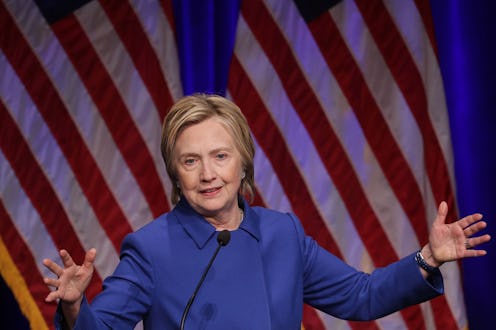News
This Election Won't Be The First To Be Challenged
Jill Stein has been out campaigning for a recount of presidential election results in several states, and her efforts have paid off in at least one. Wisconsin is now recounting their vote, where the difference separating President-elect Trump and Hillary Clinton is 22,177 votes. Stein is raising money for recounts in Michigan and Pennsylvania as well. Most commentators acknowledge that these recounts are unlikely to change the election results, though detecting fraud (if there is any) is a worthy goal, even if Trump still remains the winner. And indeed, if history of American recounts is any guide, this one will result in no change to the current results.
As Carl Bialik points out at FiveThirtyEight, the biggest change in votes recorded in recent memory occurred in the 2000 Florida recount. There, Democratic candidate Al Gore ended up with 1,100 more votes than the first tally gave him. But that still wasn't enough to surpass then-Republican candidate, George W. Bush, whose win in Florida was the deciding electoral victory that made him president. That 1,100 number is important to keep in mind, since it far exceeds the median recount swing of about 219 votes. In order to best Trump in Wisconsin, Clinton would need a monumental transfer of votes, 20x the size of Al Gore's.
That's not to say an overturn of election results is unprecedented. In 2008, the race between Sen. Norm Coleman (R) and Al Franken (D) was initially called in Coleman's favor. But since the margin of victory was just a few hundred votes, Franken asked for a recount. From there, the Minnesota senate race became a saga (books have been written on it). Eight months later, the Minnesota Canvassing Board and Minnesota Supreme Court at last declared Franken the winner, by a grand total of 312 votes.
Another tale of a recount changing election results comes from New Hampshire circa 1974. After the closest race in Senate history, the two candidates had to call for a second election. The Republican Louis Wyman won out over Democrat John Durkin, but the margin was still too close, at 355 votes. So after the state Senate could not come to a conclusion on who actually won, a third election was held (seriously). Durkin proved to have the more motivated grassroots, or perhaps Democrats were simply more fed up with the shenanigans. At any rate, Durkin won at last with a margin of 27,000 votes (which is a good news number for Clinton in Wisconsin).
In order to win, Clinton will need recounts in Michigan, Pennsylvania, and Wisconsin to all flip her way. That seems highly unlikely. However, if fraud or hacking of voting machines is detected, that could change the trajectory of Trump's inauguration. The story's not quite over yet.
